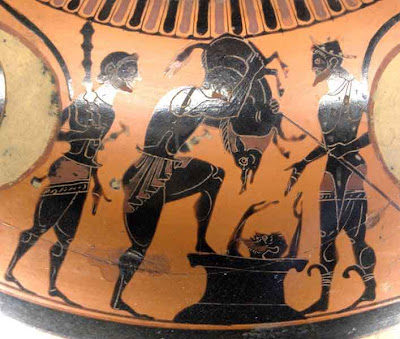This picture is from a vase painting at the Louvre in Paris. The story goes that when Hercules showed the boar to Eurystheus he was so afraid that he hid in a cask!
a)
Tum véró iússus est Herculés aprum quendam capere quí illó tempore agrós Erymanthiós vástábat et incolás húius regiónis mágnopere terrébat. Herculés rem suscépit et in Arcadiam profectus est. Postquam in silvam paulum prógressus est, apró occurrit. Ille autem simul atque Herculem vídit, statim refúgit; et timóre perterritus in altam fossam sé próiécit.
Herculés igitur laqueum quem attulerat iniécit, et summá cum difficultáte aprum é fossá extráxit. Ille etsí fortiter repúgnábat, núlló modó sé líberáre potuit; et ab Hercule ad Eurystheum vívus relátus est.
b)
Some words have been chosen for special consideration and are listed below. For the words not included in this list please refer to the WORDLIST in PAGES TOP RIGHT SIDE BAR.
Quendam – a certain, (i.e. not specific) boar is an indefinite adjective which can also be used as a pronoun. It looks feminine as it ends with dam and the temptation may be to put dum but you must remember that it is the beginning of the adjective which changes in this case and the ending remains the same – see quidam, quaedam, quoddam, indef. adj./pron., a certain, certain etc. in GRAMMAR NOTES, LEFT SIDEBAR UNDER PAGES.
Illo tempore – ablative case to indicate time when, ‘at that time’.
Vastabat – imperfect tense to indicate that the action has been going on for some time.
Huius regionis – genitive case ‘of this region’ see hic, haec, hoc in ESSENTIAL GRAMMAR NOTES.
Magnopere – is an irregular adverb, from magnus, meaning ‘greatly’- SEE IRREGULAR ADJECTIVES AND ADVERBS IN ESSENTIAL GRAMMAR NOTES, TOP OF LEFT SIDEBAR IN PAGES.
Profectus est – perfect tense of the deponent verb proficiscor – to set out, which look passive but are active in meaning and means therefore ‘he set out’.
Paulum – is another irregular adverb derived from from the adjective paulus, little, meaning ‘a little, somewhat’.
Apro – why is this apro and not aprum? Because some verbs take the dative case and occurrere is just one of them, see DATIVE CASE in ESSENTIAL GRAMMAR NOTES for a list of the most common verbs which take the dative case.
Altam – feminine accusative adjective of altus -a, -um,
Quem – masculine accusative relative pronoun ‘which’, see quid, quae, quod in ESSENTIAL GRAMMAR NOTES, left sidebar under PAGES.
Iniecit – threw on, or in, perfect tense of the compound verb in + iacio.
Summa cum difficultate – notice again the preposition sandwiched between the adjective and noun in Latin which is a common construction whereas in English we would have preposition, adjective, noun – with + great + difficulty.
Etsi – conjunction meaning ‘although’, ‘even if’.
Ab Hercule – notice that a becomes ab before a vowel or h and that we use the preposition a or ab when meaning ‘by…’ when referring to a person as agent but leave it out when referring to things as instruments.
Vivus relatus est – nominative passive ‘he was brought back alive’.
c)
Note: This section is not translated into idiomatic English but is intended, together with the notes, to give you the gist of the meaning; you can then come up with your own improved translation.
Tum véró iússus est Herculés aprum quendam capere
And then Hercules was ordered to seize a certain boar
quí illó tempore agrós Erymanthiós vástábat
which was at that time laying waste the fields of Erymanthus
et incolás húius regiónis mágnopere terrébat.
And was greatly terrifying the inhabitants of this region.
Herculés rem suscépit et in Arcadiam profectus est.
Hercules undertook the task and set off to Arcadia
Postquam in silvam paulum prógressus est, apró occurrit.
After he had gone a little way into the woods he ran into the boar.
Ille autem simul atque Herculem vídit, statim refúgit;
He however, as soon as he saw Hercules, immediately fled;
et timóre perterritus in altam fossam sé próiécit.
And in a great fright threw itself in a deep ditch.
Herculés igitur laqueum quem attulerat iniécit,
Hercules therefore threw in the noose which he had brought,
et summá cum difficultáte aprum é fossá extráxit.
And with great difficulty he dragged the boar out of the ditch.
Ille etsí fortiter repúgnábat,
He, although he struggled bravely,
núlló modó sé líberáre potuit;
was in no way able to free himself;
et ab Hercule ad Eurystheum vívus relátus est.
and was brought back by Hercules alive to Eurystheus.
d) The following section is as a) but without the macrons for you to copy and: i) to see if you can put the macrons in; ii) provide your own translation.
Tum vero iussus est Hercules aprum quendam capere qui illo tempore agros Erymanthios vastabat et incolas huius regionis magnopere terrebat.
Hercules rem suscepit et in Arcadiam profectus est. Postquam in silvam paulum progressus est, apro occurrit. Ille autem simul atque Herculem vidit, statim refugit; et timore perterritus in altam fossam se proiecit.
Hercules igitur laqueum quem attulerat iniecit, et summa cum difficultate aprum e fossa extraxit. Ille etsi fortiter repugnabat, nullo modo se liberare potuit; et ab Hercule ad Eurystheum vivus relatus est.
